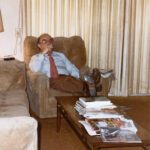I once taught a course called Literature of War at a small community college shortly before the first Iraq war. One assignment I gave was to interview someone who had been in a war about their experiences. For most of my students that would have been a father or grandfather who served in Vietnam.
An exception was a student closer to my age. He submitted this personal essay:
I served in Nam with this guy, Willie Ramirez. He had a fiancée named Elizabeth Mary or Mary Elizabeth, I forget which. One night Ramirez was bummed out by a letter from home. Not a Dear John letter sort of thing. Elizabeth Mary or Mary Elizabeth was apparently doing her virginal best awaiting the return of her soldier boy. It was about life going on at home without him that was getting Willie down. High school classmates who’d gone off to college, or had gotten good jobs, or had started a family. His mother’s surprise sixtieth birthday party. The death of his half-blind Shepherd Collie mix who’d gotten out of the fenced yard and wandered out into traffic.
Willie Ramirez got good and drunk, and I got drunk with him.
Ramirez and I were lying with our backs leaning up against sandbags set up around our perimeter. I don’t remember exactly what we’d talked about, just the usual “life sucks and pass the whiskey bottle” sort of thing.
Then the VC tried one of their night ambushes. Standard procedure for us was to let off a shitload of incendiaries to provide enough light for night baseball to see where the shooting was coming from. Ramirez and I stared up into the sky like we were three-year-olds out on the fairgrounds for Fourth of July fireworks. Ramirez took a long swig from his bottle, wiped his mouth with the back of his hand, and stood up on top of the sandbags with all that shooting going on, shouting, “Fuck you, fuck America, fuck Victor Hernandez and his brand-new fuckin’ red Chevy pick-up. Fuck every goddamn one of you chinks. I am getting goddamned tired of all this.” Or words to that effect.
Anybody else might have grabbed Ramirez by his shirttails and slammed him back to the ground, but I did what at the time seemed perfectly natural. I got up and stood next to Willie and screamed right alongside him.
All that metal crap coming at us, designed to shred human flesh and pierce vital organs, and neither of us suffered a scratch. From that day on, I knew I’d make it back home.
One of the supposed morale boosters of being in Nam was that we knew our tours lasted twelve months. Most of us had a calendar working in the back of our heads that ticked off the days left like prisoners tracking their time served. Even in the middle of a firefight, maybe because you were in the middle of a firefight, you just kept telling yourself to hang in there, you only had to last so many more days.
Ramirez and I finished our tours at the same time. A transport plane would take us and a bunch of other hung-over, smiley-faced Joes to Tokyo for some R&R until our new orders were cut. Willie and I had done some nervous partying the night before. I say “nervous” because when you’re on short time you want to be absolutely sure you don’t do anything to fuck up, and if anyone had pushed their luck as far as it could go, it was us. But it was fine, and we were there when the Jeep pulled up to take us to the airstrip and out of there for good. The driver, a red-freckled guy probably from Alabama or thereabouts judging by the accent, turned to me as I got into the back seat and said, “You lucky bastard, I’d give anything to change places with you.” This little Vietnamese girl even came up to Ramirez in the front and offered him a flower, like a going away present. Willie fished in his pants pocket for something to give her in return. Then the girl tossed a grenade into the Jeep.
Now there are stories of guys who jump on top of exploding grenades to save their buddies. As soon as I saw that girl’s arm come out from behind her, I jumped away. I felt the explosion after I hit the ground. Ramirez felt a lot more.
I scrambled to the doorway of the hotel we had just left. I saw the Jeep in flames, Alabama sprawled next to it flat on his back with his chest ripped open. I don’t remember seeing Ramirez, only that I knew he most likely was not feeling anything anymore. Then I saw the girl, not a little kid but some smug guerrilla admiring her handiwork. I saw her smile. Probably, this was her first time. She didn’t expect any of her targets to rise from the ashes, but then she saw me and took off. I chased after her. Down a back alley that dead-ended. A poor choice. I caught up with her, grabbed her, and slammed her down. I remember thinking I didn’t want to take the chance of seeing her face. She started to cry, so I pushed her face deeper into the dirt until I almost muffled her sobs. Then I reached for my sidearm, put the barrel to the base of her neck. The first shot was enough. Just to make sure, I stood up, both hands on the pistol grip, and emptied the clip into her skull. It was what you might expect shooting at a small cantaloupe to be like, with little pieces of juicy pulp splattering.
She was just a kid. But she was also the enemy. She’d taken the life of Willie Ramirez, who right up until the end was the reason I’d lived through the war, the only thing I ever believed in then, or believed in since.
I don’t wake up with nightmares, I don’t blame killing her for the fucked-up life I’ve had. And I don’t make apologies. If I hadn’t greased her, she would have blown away other soldiers, other guys who had girls waiting for them back home. That I can say something like that with absolutely any doubt whatsoever gives you some kind of idea about what war does to you.
❍ ❍ ❍
I made copies of this paper along with another that was filled with footnotes about how his father was a war hero. I later learned that one won a $100 award in a VFW essay contest. I left the names off of the copies, but there was only one guy in class old enough to write a firsthand account of being in Vietnam. I told the class that I considered one of these essays an “A” paper, an accurate depiction of what war was really like, and asked them which one they thought it was and why. Everyone picked the wrong paper. Including the guy who wrote it.
He stopped coming to my class after that. But I did run into him once more, at a pub near the college campus right before finals week. I noticed him slouching at the bar, staring intently at a ball game on one of the half-dozen televisions. I pulled up a stool next to him.
“Buy you a beer?”
He shrugged and continued to stare at the TV.
“I assume you want to know why I stopped coming to class.”
“Students drop out of my classes for all sorts of reasons. I don’t take it personally.”
He was studying his beer as if he was reading tea leaves. He was a sitting duck, and I couldn’t help but take aim.
“You know,” I said, “I remember how pissed off I got when it started to be cool to have been in Vietnam. Was a time when you sometimes felt like a war criminal around people who hadn’t been there. Then, when Reagan got in, I’d be in bars and overhear guys bullshitting about being in Nam as a way to pick up girls. Made me want to give them a firsthand taste of actual hand-to-hand combat.”
“You were there?”
“That surprise you?”
“I thought all you professors were war protesters.”
He drained his mug.
“I was career Army,” I said, ordering us another round.
“How the hell did you end up here?”
“Well, short version is that I fucked up. Lost most of my command because I didn’t listen to my NCO, thought being an officer made me smarter. To give you an idea of how dumb the Army is, I got a commendation for bravery in action when they should have court-martialed me. I talked the Army into paying for my graduate education. Two months after I got my PhD, I was turned down for a promotion for the third time. That’s the Army’s way of pink-slipping you.” I took a deep swig of beer that was half foam, repressing the urge to belch as a result of drinking and talking too fast. “So that’s what I’m doing here.”
“Can I ask you a question?”
“Sure.”
“You must have known that paper I wrote was bullshit.” He took a deep breath. “I wasn’t there.”
“I had my doubts.”
“What gave me away?”
“You know those stories about people from New York who vacation in Florida, who think it’s cute to buy a baby alligator, but when they bring it back to their apartment and it starts snapping at the poodle they flush it down the toilet? So now there are all these alligators living in the sewers.”
“Yeah, I’ve heard that.”
“Well, the New York sewer authority will tell you they’ve never seen an alligator in a sewer that wasn’t already a pocketbook. But because we hear stories about alligators in the sewers, we think there must be alligators in the sewers. In Nam, the story was the guy who made some sort of Christ-like sacrifice for his best buddy. Or killing a kid without remorse because the enemy doesn’t have an age cut-off. That got pretty popular after My-Lai.”
“You don’t believe that happened?”
“I know it happened, but not the way the story gets told. And the guys who actually got caught up in that don’t talk about it. At all. Ever.”
He chugged the rest of his beer, slammed the glass down on the bar, and cupped his hands around it as if for something to hold onto.
“I wanted to go. I’d enlisted—Marines, man.” He said that the way every leatherneck did, even if all they ever did was clean out latrines, like the other services are pussy tours. “I fucking volunteered.”
“What happened?”
“I was in San Francisco, night before me and my battalion were due to ship out to Nam. Did the local sex strip scene, you know, last fling, and things got out of hand. Got into a fight with Shore Patrol, guy used his club across my kneecap, shattered it. Government paid for years of rehab. I still get a disability check. But I didn’t get to go. All I got was busted to private and discharged ’cause I wasn’t fit to fight anymore. Man, some guys were trying to bust their knees on purpose just to avoid getting drafted, and here I wanted to go and couldn’t.”
“You were better off.”
I didn’t know what else to say, so I ordered yet another round.
“There’s just one thing I don’t get,” he said.
“What?”
“How come you gave me an A on that paper? And then hold it up to the entire class as what real history is all about, not just some dry shit that quotes a bunch of experts like in that other paper?”
“I honestly thought the paper deserved an A.”
“But I made it up.”
I sighed. “Just because it didn’t happen doesn’t mean it’s not true.”
He nodded, his expression reminding me of the men I’d asked if they were all right after they’d just watched the guy in front of them step on a land mine.
❍ ❍ ❍
The newspaper reported that he slammed his motorcycle into a telephone pole after leaving me at the pub.
I still had the paper he’d written and drove over to his apartment to deliver his last earthly thoughts to a girl he had lived with. In the driveway was his mangled Harley. I’d worn a dark suit and a tie as if I were going to his funeral.
I knocked on the door. A woman in her early thirties—tight jeans, cigarette dangling from reddened lips— answered. A strand of dark hair fell in front of her eyes. She wore a black POW-MIA T-shirt.
“What do you want?” she asked from behind her nicotine haze.
“My condolences for your loss.”
She smiled. “How’d you know him?”
“From the war,” I said.
David Soyka
David worked as a newspaper reporter, English teacher, and garbageman, professions that are somehow oddly related. His work has appeared in The New York Times, Santa Barbara Review, Blackgate, and Extrapolation, among other publications.








